Practicing Harp Happiness
#250: Masterclass: Making an Etude Out Of Your Piece
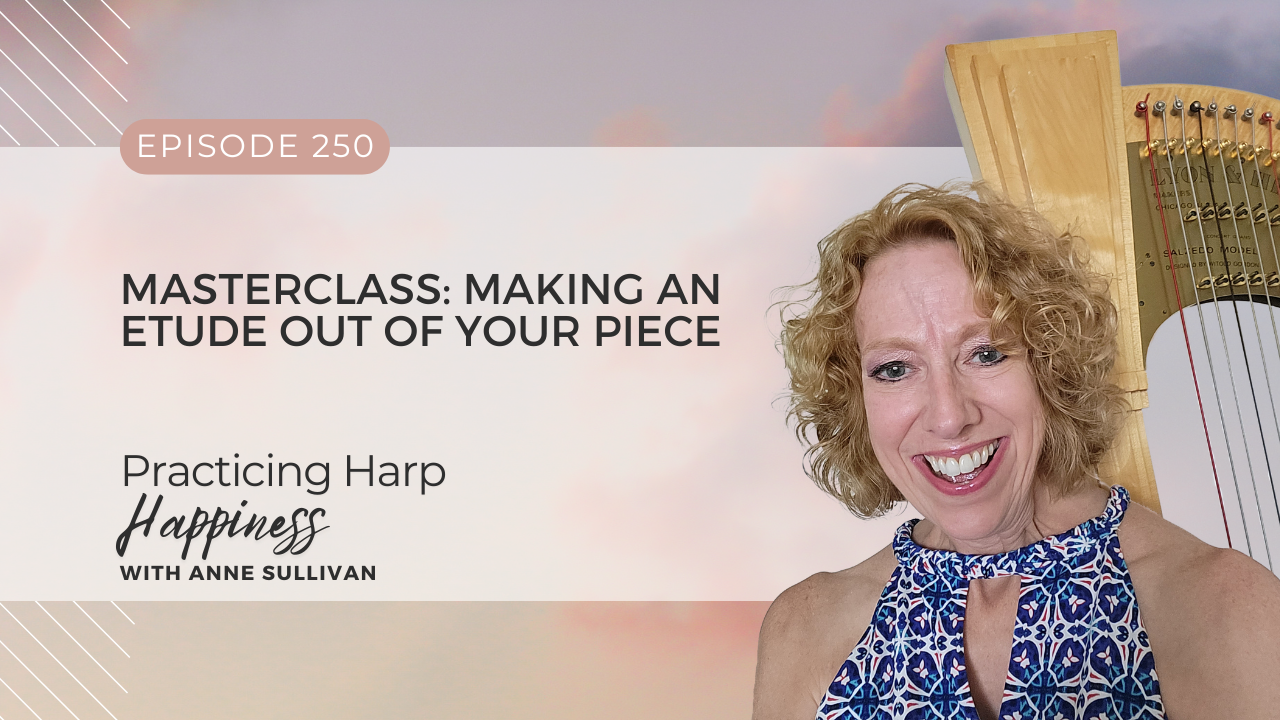
Today’s show is a masterclass, a show where I get to dig in to how to do something. We aren’t just talking big picture concepts; we’re going to get down to the nitty gritty.
I have to say this is my favorite kind of show to do, because it feels like teaching, almost like we’re right here together in the same room, and I’m sharing what I’ve learned to help you learn too. I love that.
And I really enjoy this topic too.
Our topic is how to make an etude from a piece you’re trying to learn. Let’s say you’re working on a piece and most of the piece is ready to go, but there’s one part that just won’t come together. You could take that section and make an etude out of it. Or perhaps the piece you’re learning is really a little above your head, and you’re not really stuck, but the going is very slow. There are etude possibilities there too.
I’m sure many of you already do something like this, whether it’s playing that section in different rhythms or just keeping the tempo slow while ...
#248: Answers to Your Questions: Relaxed Playing and Tuning By Ear
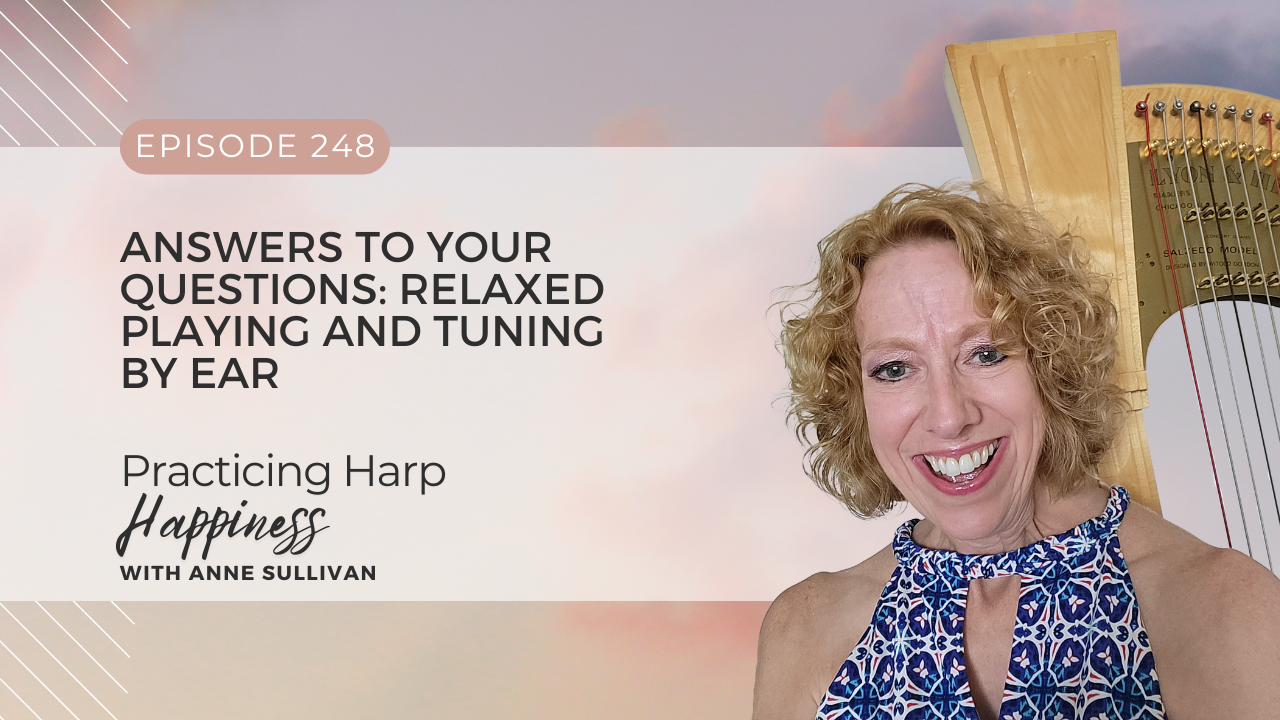
It’s time for another “Answers to Your Questions” episode. I love these episodes because I get to speak to topics that are on your mind, rather than just talking about topics I think you want to know more about. And we have two really great questions to talk about today.
Before I tell you what those questions are, I want to say that my personal criteria for choosing these questions is when I have been asked the same question by three or more people in a relatively short time frame. Usually the questions come in response to something I’ve talked about in the podcast, like our first question today, or something we discussed on one of the Live Monday Warm-Ups. Today’s second question came up on a recent warm-up.
My feeling is that when three people have asked it, there are a bunch more harpists who would have liked to ask it but didn’t. And so I know that there are lots of harpists who really would like to have the answer, even if they let someone else ask the question. So if you’re ...
#247: How Not to be a Control Freak Harpist
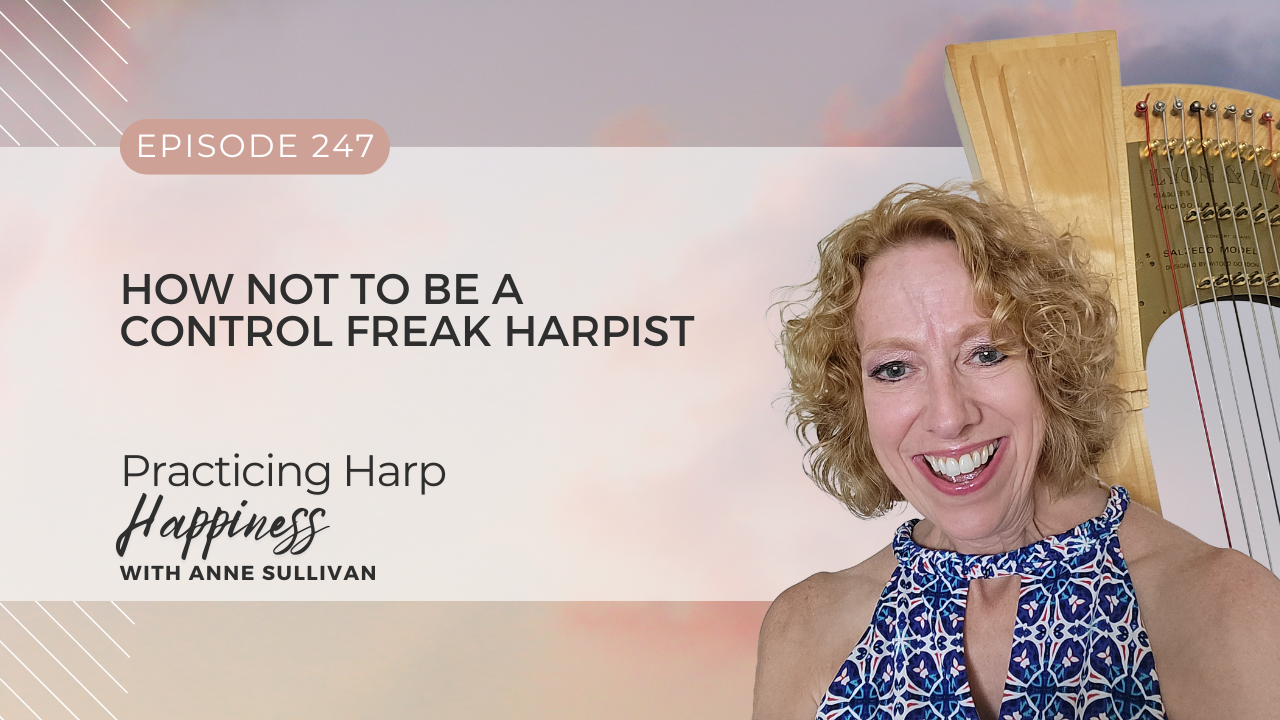
Today we’re talking about control. Control is a word that comes up a lot in our harp playing, whether it’s about controlling our fingers, our dynamics, tempo, tone, focus, or a hundred other relevant things. It feels like we’re always trying to gain control over something in our playing, or over ourselves.
But the path to mastery isn’t about asserting control; it’s actually about letting go of control.
If you search, you can easily find dozens of books that explore the idea of control in music, and nearly all of them start out with the idea - sometimes it’s even written in the title - that we gain control by letting go. It’s a simple enough concept, but it comes with a big paradox: letting go of control essentially requires us not to do what we’ve been training ourselves to do. For example, we train ourselves to play the right notes, which usually requires a lot of focus, concentration and sometimes sheer willpower, in other words, control. But if we don’t let go of that control...
#245: Next Level Musicianship: The Sensory Triangle
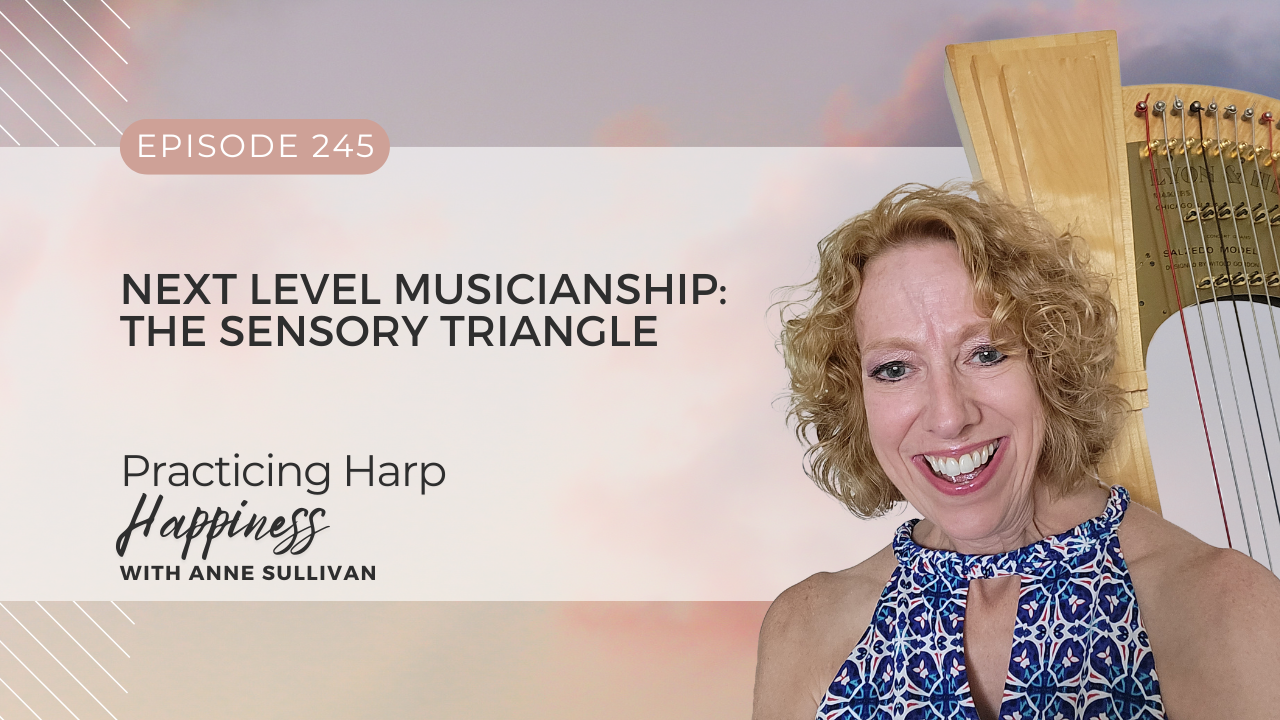
If you’ve listened to me for a while or taken any of my classes or workshops, you know that I love finding the solutions to problems we harpists face and creating the step by step plans to take action to solve them. I’ve discovered over my years of teaching that it’s not hard to define the problem, at least the surface problem. For instance, if your left hand can’t play the notes in two specific measures of your piece, then that’s the problem, and the solution is easy: drill the notes.
Sometimes, however, the real issue lies a few layers down. Maybe the reason the left hand can’t play those measures isn’t the notes. Perhaps there is a technical issue, or maybe reading bass clef is the sticking point. It could be a counting issue or even not quite understanding what the meaning of the music is at that moment. So when I’m working with my Gold Circle students, we often spend some time digging a little deeper to see where the real issue is. Then we can define the proper steps to addres...
#244: Next Level Technique: 3 Myths You Need to Bust
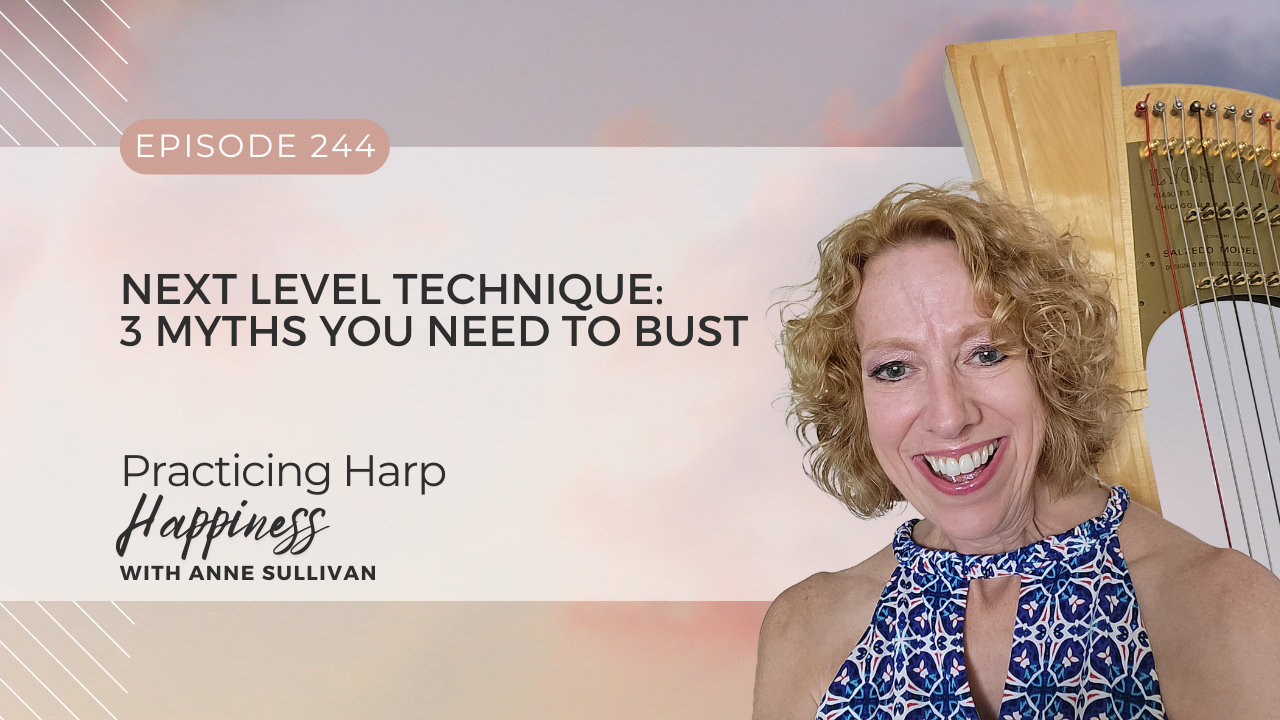
If you heard last week’s podcast, you may remember that this month’s podcast episodes are all about growth, your growth as a harpist and the systems and skills that are necessary for that growth.
Last week, we talked about three key systems that you need to have in place for growth. This week is all about technique. I know it may sound like a dry as dust topic to some of you. Harpists generally fall into two distinct camps: those who hate doing technique exercises and those who love them. So if you love your Grossi and LaRiviere or whatever exercise book you use, this podcast is going to be right up your alley. We’ll dive into how you can use what you’re doing now to get to that next level of technical proficiency.
If you’re in the other camp, one of those who feels like exercises are torture when all you want to do is play pretty pieces, I hear you. I’m talking to you as a convert. Granted it was many years ago when I finally realized that exercises weren’t just for solving prob...
#230: Here’s Why You Should Do It My Way: A Teacher’s Response
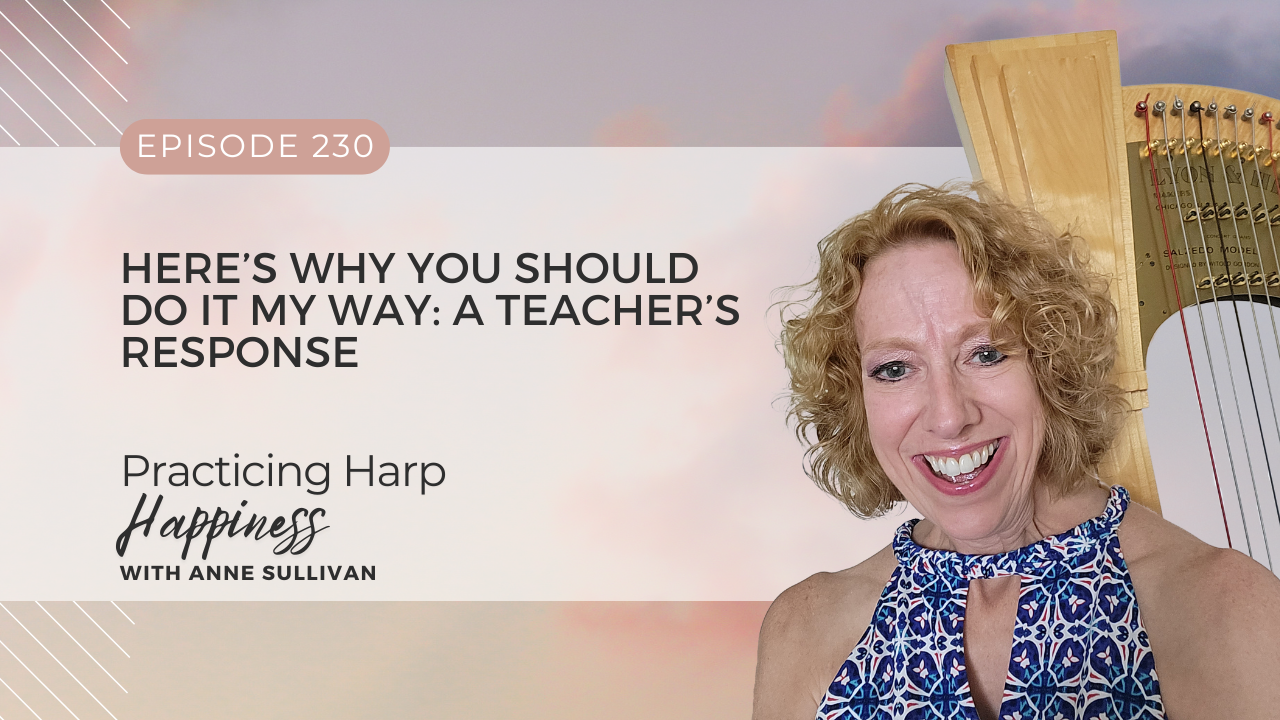
I once had a student say this to me: “But it doesn’t work when I do it that way.”
We were trying to fix a passage in a piece she was learning. When she played the passage for me, there was an obvious stumble spot, and I had a definite idea about what was wrong and how to fix it. But after a week of trying to implement my suggestion, she came back to me, saying that her old way, even though it wasn’t really working, worked better than mine and so she was sticking with her way.
Please understand that the student didn’t doubt the solution I was offering. She had tried it, just as I had suggested. She had confidence in my ability to help her surmount this difficulty. The frustration for her was not just that the solution I offered didn’t work; it was that her old way was actually better for her, at least at that moment.
At that point in our lesson, I could have responded with the all-time favorite response of music teachers everywhere - you have to give it some time. That would cer...
#228: The Real Reason to Memorize Your Music
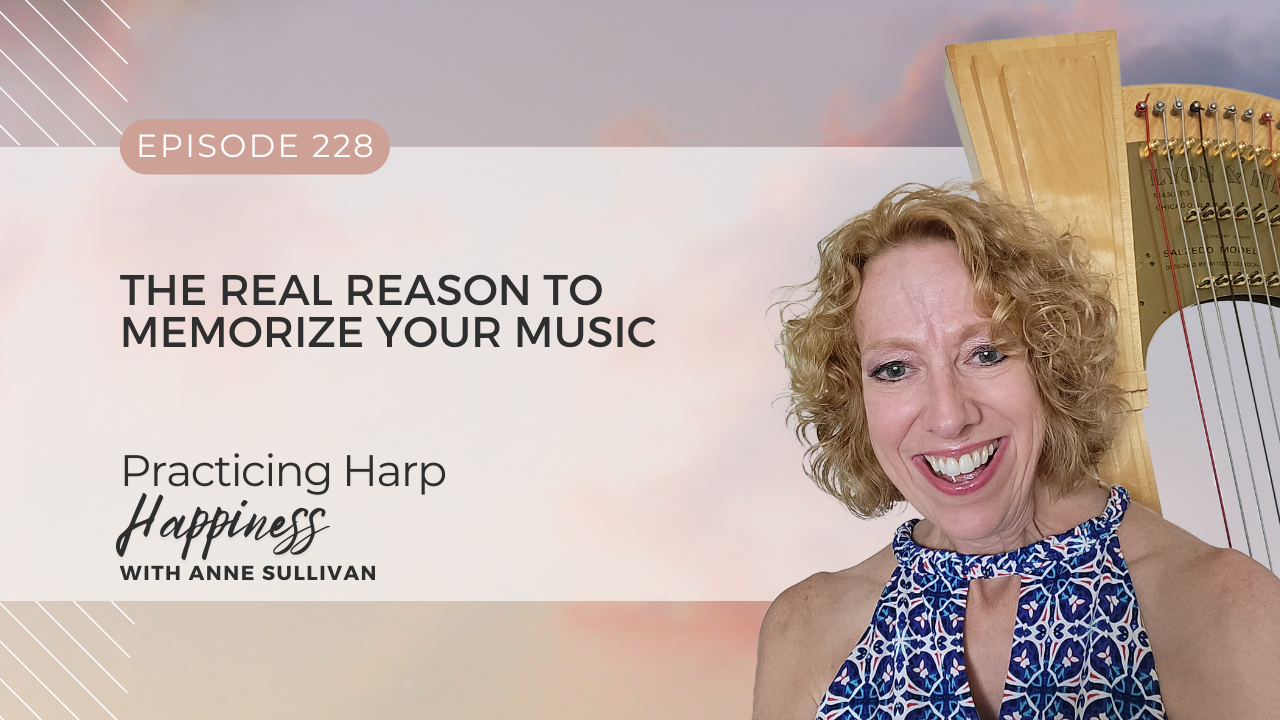
Do you have to memorize your music? Of course not. How’s that for an easy answer. Okay, the podcast is over and we can call it a day. But of course, the answer isn’t that simple.
No, you don’t have to memorize your music, but the fact that you’re asking the question tells me that you’re almost certainly thinking about memorization the wrong way, or at least very differently from how I have learned to think of it.
What I want to help you understand today is the role that memorization can play in your musical growth, how it can make you a better musician, how it can help you learn music faster, not necessarily because you are memorizing, but because the act of memorizing brings your focus to the music in a different way.
But not if you’re trying to memorize the way you may have when you were young. The kind of effortless assimilation that came so easily to me when I was younger, and perhaps to you too, doesn’t happen with my aging brain. I still memorize, but I use a process that ...
#227: Why Every Harpist Needs a Method
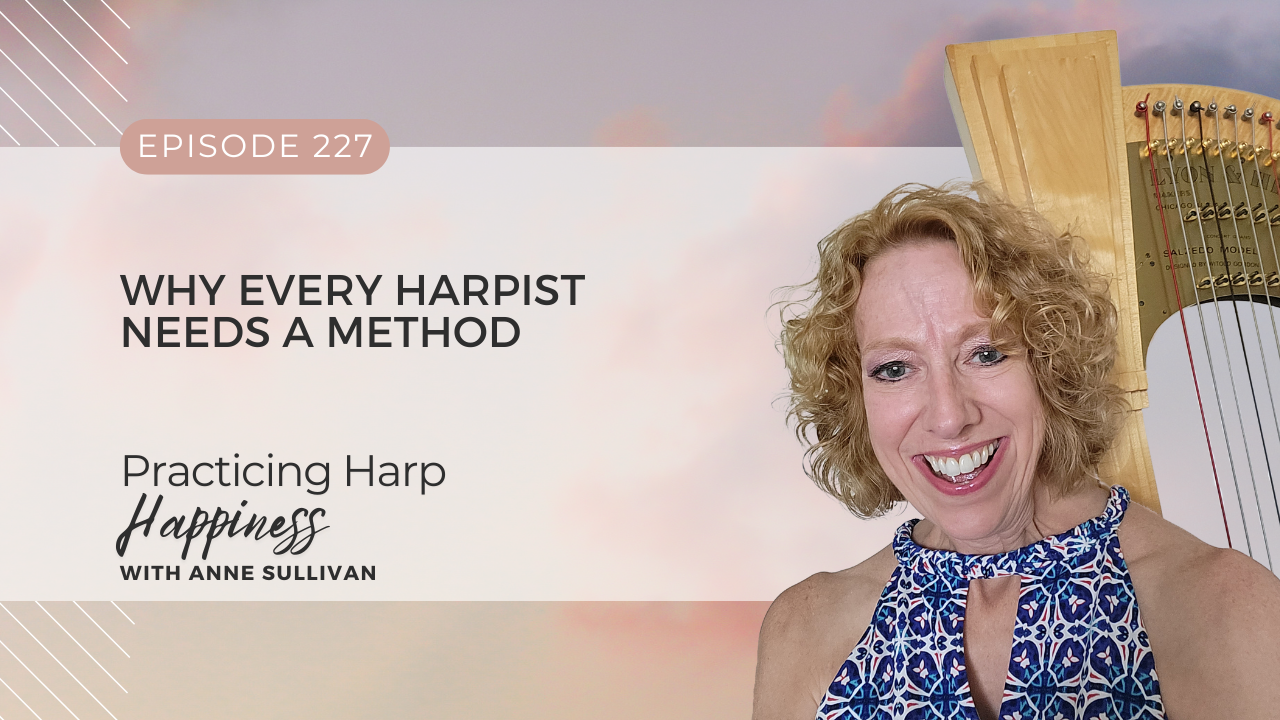
When I was a beginning harp student, the technical method I was learning - the Salzedo method - was something I took very seriously. From my very first harp lessons, I learned the important points of technique, as Salzedo taught it. I wasn’t studying with Salzedo, of course, but my teacher, Marilyn Costello, was a student of his, and his method was what she taught her students.
For a long time, I played the harp in innocent ignorance of the fact that there were other harp methods. In fact, it was a revelation to me in those early years when I discovered that most harpists in the world didn’t use the Salzedo method. Truly, all the harpists I knew in the Philadelphia area were Salzedo method players, and it never occurred to me that this wasn’t true across the wider harp-isphere.
Once that realization hit, I went into what I’ll call Stage Two of my education about harp methods. That was the stage where I believed that everyone who didn’t play Salzedo method wasn’t playing the right...
#217: The Secret to Dexterity: Crosstrain Your Hands
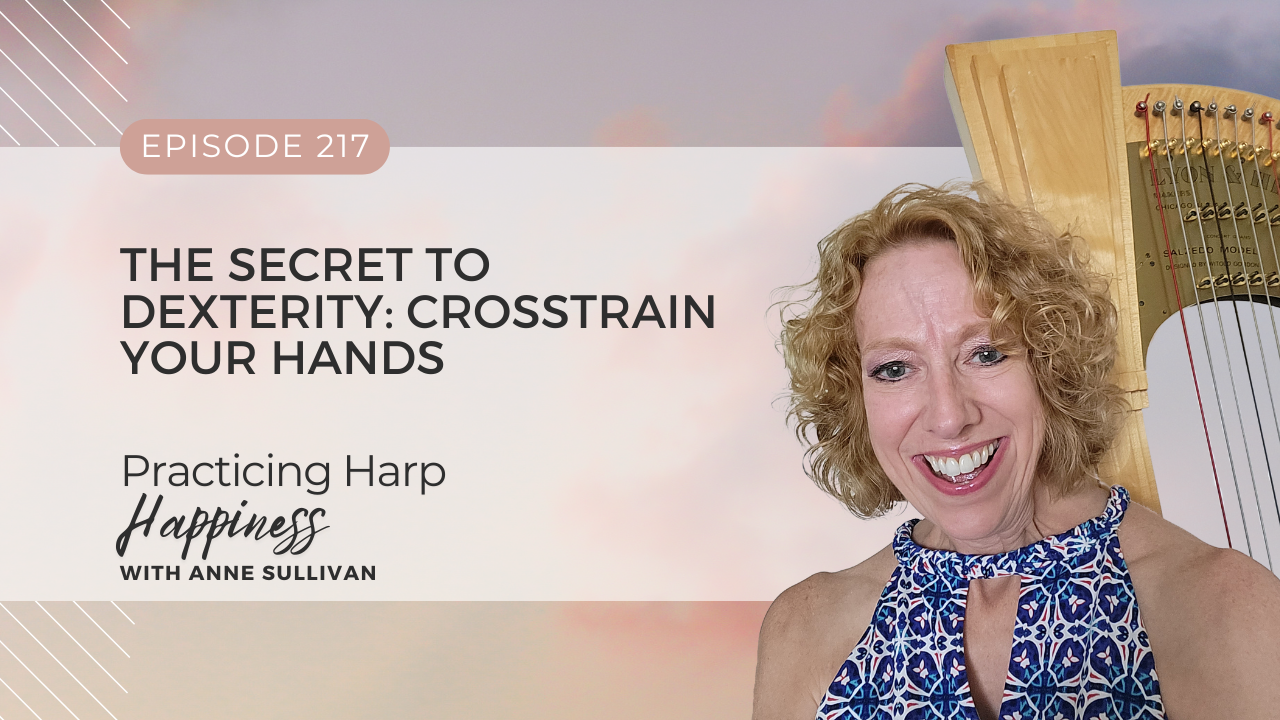
Happy Bastille Day! This isn’t a French themed podcast episode, and we won’t be breaking the bars on any prisons today. However, while the French national motto of liberté, égalité, fraternité is sounding across the globe, we should give some thought to the unequal treatment we give our hands. I mean the difference in the demands we place on our right and left hands.
Probably you’ve thought about the very different roles that our hands play musically. Most often, the right hand plays a melody and the left hand plays an accompaniment. But think about it in a practical, action-related way for a moment. If our right hand specializes in melodies, then it likely is accustomed to connected, legato playing, along with some chords and arpeggios.
Our left hand, though, because it serves to support the melody, is more used to jumping between low bass notes and chords above them, or playing a series of octaves, or playing continuous arpeggiated accompaniments. That is a very different skil...
#213: Freedom to Choose - How to Make Any Piece Sound Right
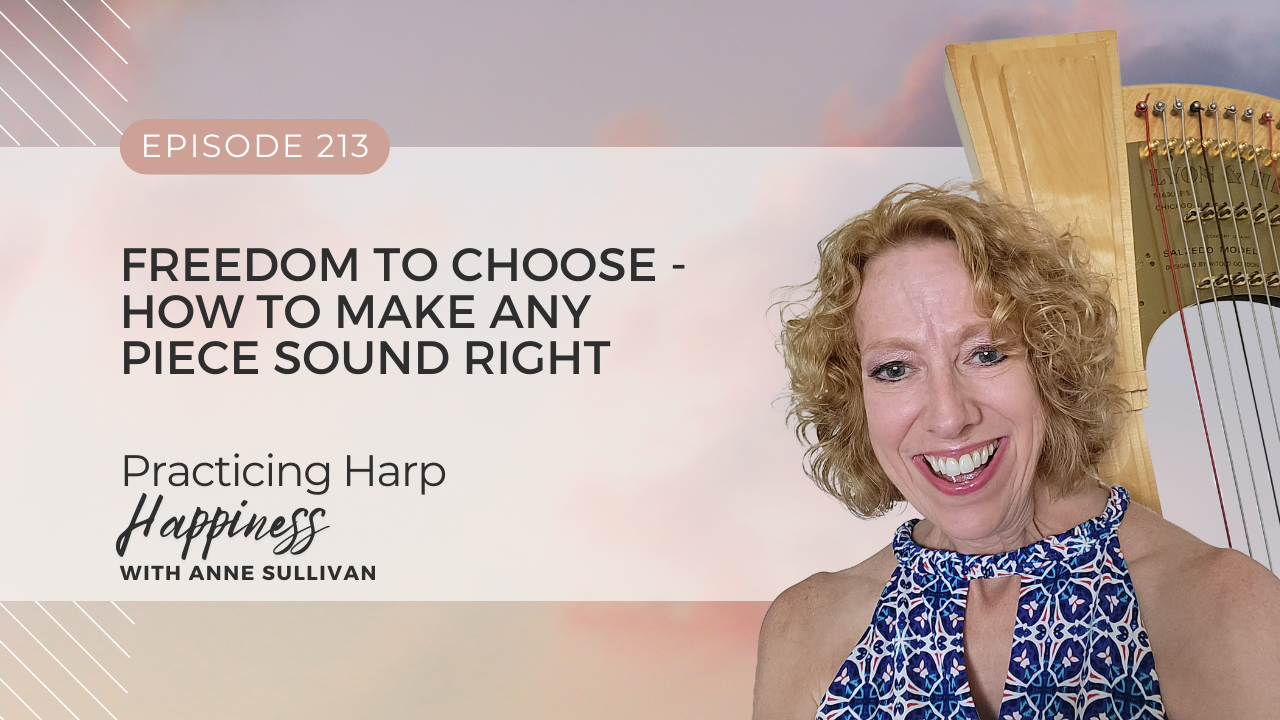
Have you ever made something and it turned out ok, but somehow it just didn’t look right? Maybe you thought those two paint colors would go together, but now you’re not sure. Or maybe the furniture arrangement in the living room looked great on paper but it sort of doesn’t work now that you see everything in place.
I think we’ve all had those moments. I had one not long ago with a photo I was doing. It wasn’t quite right, but since I had to get it done, all I could do was to shrug and sign off on it, whether it was right or not. But if a piece of music we’re working on doesn’t sound right, we want to fix it, not forget it.
I’m sure you know what I mean. You’ve been working hard on a piece. You muster up your courage to do a recording of it and after a lot of takes, you come up with one that you think is pretty good, without noticeable mistakes or hesitations. Then you listen to it, and something’s not right. Is it too slow? Are you not making the dynamics clear? How come it doesn’...

